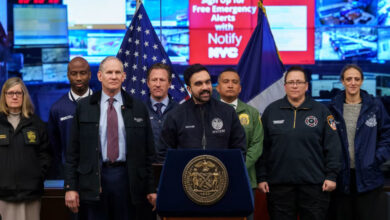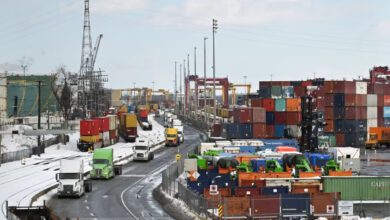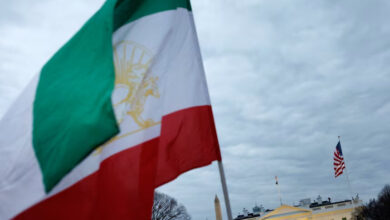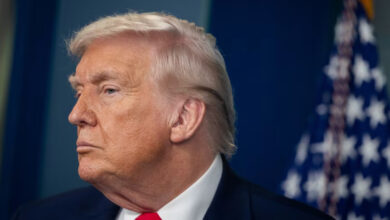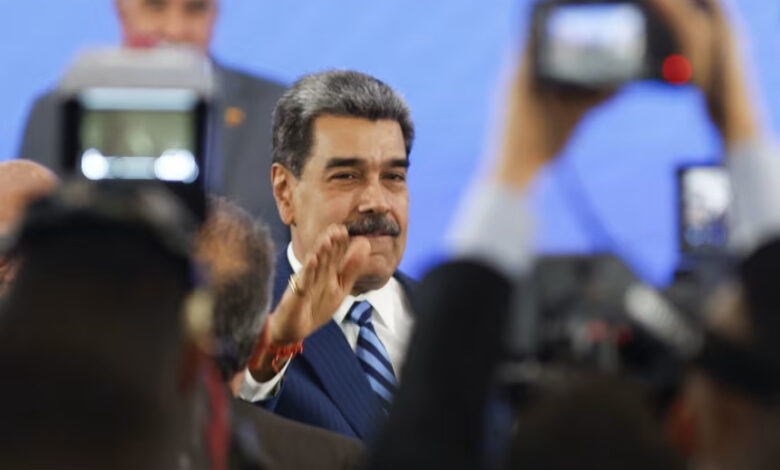
President Donald Trump has said he believes Venezuelan President Nicolas Maduro’s days are numbered, and that land strikes inside Venezuela are possible.
Experts say that the US doesn’t currently have the military assets in place to launch a largescale operation to remove Maduro from power, though Trump has approved covert action within Venezuela, CNN has reported.
But if Trump did order strikes inside Venezuela aimed at ousting Maduro, he could face serious challenges with fractured opposition elements and a military poised for insurgency, according to experts, as well as political backlash at home for a president who promised to avoid costly entanglements overseas.
CNN reported that Trump received a briefing earlier this week to review updated options for military action inside Venezuela, a concept the White House has been weighing. The administration had not made a decision on whether to launch strikes, CNN reported, though the US military has moved more than a dozen warships and 15,000 troops into the region as part of what the Pentagon branded Operation Southern Spear in an announcement Thursday.
The concentration of military assets and threats of further attacks beyond the ongoing drug boat campaign have served to increase pressure on Maduro, with administration officials saying he needs to leave office while arguing that he’s closely tied to the Tren de Aragua gang and leading drug trafficking efforts.
But if Maduro does flee Venezuela or is killed out in a targeted strike, experts worry about a military takeover of the country or the boosting of another dictator similar to Maduro.
There are other members of the Venezuelan Chavismo, the leftist political ideology of former Cuban leader Hugo Chavez that Maduro has championed, who could take the reins and subject the country to even harsher rule, experts and former officials said.
“Maduro has said something to the effect of, ‘You want to get rid of me? You think things will get better?’ It is something to consider because Maduro is a moderate inside the Chavismo, and someone else could usurp power instead of the opposition with the backing of the military,” said Juan Gonzalez, a resident fellow at the Georgetown Americas Institute who was a former Biden administration official focused on the region.
Another possibility would be a military takeover.
“If the military is still cohesive, and I don’t think we see any evidence it is not, they will not collapse because there is a challenge to or an ouster of Maduro,” said John Bolton, Trump’s former national security adviser in his first term. “They will follow their discipline, assert military control, and suppress anyone who goes into the streets.”

Maduro, whose inner circle is made up of both civilians and military officers who are often in competition with each other, is known to have tight control over his administration and has helped stabilize competing factions. External forces, like Colombian insurgent groups who regularly operate from Venezuela or criminal syndicates linked to cocaine, gold and mineral trafficking further complicate the picture.
Were Maduro to disappear, these pulls could tear the nation apart – descending into a potential civil war, experts said.
“Whether you like it or not, Maduro is the guarantor of the equilibrium,” said a Western diplomat who has spent years in Venezuela, asking to speak anonymously because they were not authorized to discuss with the press. “Everyone knows he’s been politically dead since last year’s election, but if he leaves there’s nobody who can maintain the status quo … so they all close ranks around him.”
Opposition Figures
The Trump administration may hope that Venezuelan opposition figures would be able to step into a power vacuum created by the removal of Maduro, something that the first Trump administration considered as it propped up Venezuelan opposition leader Juan Guaido after a 2018 election victory for Maduro that was decried internationally as rigged. That first Trump administration officially recognized Guaido as the legitimate leader of Venezuela in 2019, but a failed coup attempt that year meant he never managed to take power.
One current Venezuelan opposition group led by Edmundo Gonzalez, who ran for president last year in an election that the US said Maduro lost, says it has a 100-hour plan to transition the power of Venezuela’s government from Maduro to Gonzalez. But experts say that they would be unable to succeed in the short-term or in the long-term without sustained US support – and potentially US boots on the ground.
“The idea that a member of the opposition would be able to rule almost immediately is impossible. There is no way to guarantee their safety or ability to govern without the US providing security,” Juan Gonzalez said. “Everyone is viewing removing Maduro as the end but it’s really just the beginning of what would be a long, drawn-out process.”
US officials have also said that Edmuondo Gonzalez, who is currently residing in Spain, is the rightful leader of Venezuela, based on the results of last year’s election. The US has provided limited support to another Venezuelan opposition leader, María Corina Machado, who went into hiding in the country after the election. The assistance includes support, like gaining access to secure communication capabilities, former US officials said.

But in order to keep any of the potential opposition leaders in power the type of support needed from the US would go beyond providing a secure device – there would need to be assistance in reconstructing the army, unfreezing Venezuelan government funds and training their police force, experts said.
The opposition’s enemies inside Venezuela are not limited to Maduro himself, which is why such sustained outside support is seen as a necessity, experts said. The opposition would face hostilities from the Venezuelan military; pro-government paramilitary groups known as colectivos; the National Liberation Army (known as the ELN), which is a Colombian guerilla group that currently has safe haven in the country; and other active criminal groups.
It is unclear how much support Trump would be willing to give any opposition leader who seeks to take the presidency from Maduro. But that support would need to be sustained, officials said, to fend off a failed state.
Such an extended US military involvement runs the risk of upsetting the political coalition that propelled Trump into office on promises of keeping America out of overseas wars.
“The American people did not vote for Trump to draw the US into a sustained conflict in Latin America. On that basis securing Trump’s commitment to long-lasting support for the opposition is likely to be a challenge,” said a GOP congressional staffer. “And without that support, this won’t work.”
Still, if Trump backs away from a potential opportunity to oust Maduro now, some believe it could be viewed as a lost opportunity.
“Trump is calling Maduro a narcoterrorist and a drug trafficker, and has assembled a huge armada. If he backs down now and Maduro survives, there goes all the ‘new Monroe Doctrine’ talk and the idea of being supreme in our own hemisphere.” said Elliott Abrams, a former senior State Department official in Trump’s first term.
Entanglements
Even while some say that displacing Maduro could be done without US troops on the ground for an extended period, they say that the US commitment following any kinetic strikes needs to be long-lasting or else the effort could easily fall apart.
“If the force is decisive it can disband a full army. But whatever is done cannot be done with a short-term perspective. The use of force needs to create a result and be connected to a political solution with US support, and planning for that support for 5-10 years,” said a regional diplomat.
The Maduro regime is propped up in different ways by Russia, China and Cuba. Experts worry that if US strikes hit assets of those nations the conflict could quickly escalate. While it is unlikely that any of those nations would send their troops to the region to defend against US strikes, it is possible that the effect of US strikes inside Venezuela could be blunted by the support those countries provide to the regime.
All three nations have invested in the Venezuelan regime and have instruments that they could bring to bear to prevent Maduro’s ouster, experts said.
This is something that has happened in the past.
“In 2019, the opposition thought that the Cubans had uncovered what they were trying to do with their coup attempt and believe that they made moves to undermine their efforts,” Bolton said.
Further expanding the problem could be a move by Maduro to hit US assets in the region – before the US makes any move to directly oust him.
“There is a chance that if Maduro thinks he is going down he might make a move to hit something the US cares about, such as oil platforms in the Caribbean Sea. It could be a gamble he may be willing to take that would harm US interests in the region,” said Henry Ziemer, a regional expert at the Center for Strategic and International Studies.
Publicly the Trump administration continues to point to its buildup of military assets in Latin America as supremely focused on counter-drug operations – not an ouster of Maduro. Experts have also previously told CNN that the assembled hardware and troops aren’t enough for a full-scale invasion.
Still, when asked earlier this month if the US might get into a war with Venezuela, Trump gave an ambiguous answer, saying: “I doubt it. I don’t think so.”

